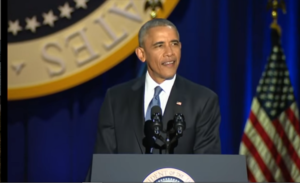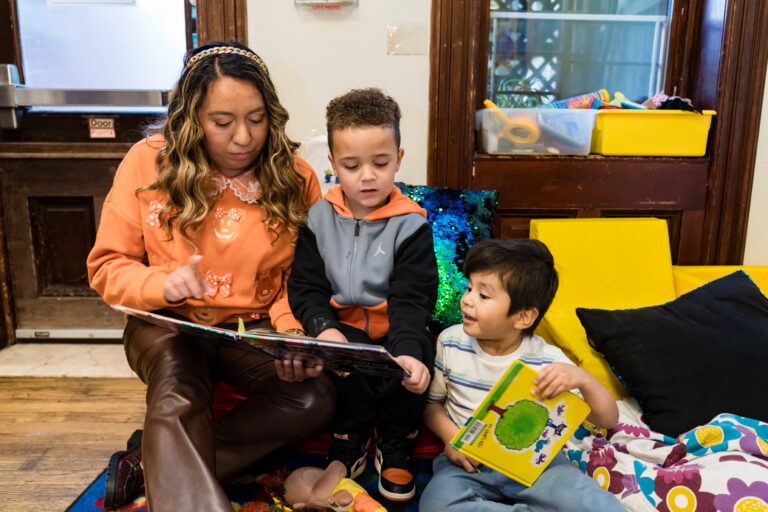 People can’t stop talking about President Obama’s farewell address, which sure is saying something, because presidential farewells are typically regarded as snoozers. (President George W. Bush’s staff reportedly had to beg networks to air his.) There’s no question that part of the reason why Obama’s remarks were water cooler-caliber was because they were uncommonly eloquent (which they were), or because we’re having end-of-term nostalgia (which many people undoubtedly are), or because his tone was so strikingly dissimilar to the tone taken by his successor the next day. But I think the reason the speech resonated with so many people was because of its spot-on emphasis: that in this uncharted, unfamiliar landscape we find ourselves in, the way forward lies in so-called ordinary people coming together for common purpose. And that truth unmistakably leads us to the conclusion that social impact organizations have an increasingly important role to play. Here are some quotes from Tuesday’s address that speak to this.
People can’t stop talking about President Obama’s farewell address, which sure is saying something, because presidential farewells are typically regarded as snoozers. (President George W. Bush’s staff reportedly had to beg networks to air his.) There’s no question that part of the reason why Obama’s remarks were water cooler-caliber was because they were uncommonly eloquent (which they were), or because we’re having end-of-term nostalgia (which many people undoubtedly are), or because his tone was so strikingly dissimilar to the tone taken by his successor the next day. But I think the reason the speech resonated with so many people was because of its spot-on emphasis: that in this uncharted, unfamiliar landscape we find ourselves in, the way forward lies in so-called ordinary people coming together for common purpose. And that truth unmistakably leads us to the conclusion that social impact organizations have an increasingly important role to play. Here are some quotes from Tuesday’s address that speak to this.
Change only happens when ordinary people get involved, and they get engaged, and they come together to demand it.
If there’s anything Americans take from the speech, I hope it’s these four calls to action: get involved, get engaged, come together, and demand. All four need to happen to effect change. Alcohol and automobiles coexisted for nearly three-quarters of a century, with more than a million people in a decade having been killed or injured by drunk drivers, before Mothers Against Drunk Driving joined together, dove into the issue, and demanded change – and succeeded within five years.
Individuals should join with organizations whose missions they support, and individual organizations should join forces with other like-minded organizations for maximum effect.
Roll up your sleeves and get involved by doing the work yourselves, and amplify your voice and your efforts by joining with others, to the point that they can’t be ignored.
What a radical idea, the great gift that our Founders gave to us. The freedom to chase our individual dreams through our sweat, and toil, and imagination — and the imperative to strive together as well, to achieve a common good, a greater good.
After more than 25 years of working with underserved, poverty-stricken communities, this is what I know to be true: that the vast majority of the people who live in them are looking only for the opportunity to go as far as their own abilities, efforts, and dreams will take them – especially for their children. Children like Tyliek, who was born in the Brownsville/East New York section of Brooklyn, one of the most disadvantaged communities in the country. Worried about the quality of education he would get there, and the culture of gangs and crime that was difficult to escape, his mother sent him to The Child Center of NY’s Aspirations Diploma Plus High School, where students have access to academic assistance, internships, and an advocate counselor whom students can count on for guidance. There were times Tyliek stumbled on his path toward graduation and a better life, but the support system at Aspirations was there to help him secure his footing. Today, he’s a student at SUNY Buffalo State, where he made the Dean’s List. He talks to kids in his neighborhood about college –something they previously couldn’t see themselves pursuing –and is no more likely to pursue a life of crime than you or I. The more people who contribute to the greater good, the better off we all are.
Understand democracy does not require uniformity. Our founders argued, they quarreled, and eventually they compromised. They expected us to do the same. But they knew that democracy does require a basic sense of solidarity. The idea that, for all our outward differences, we’re all in this together, that we rise or fall as one.
And here it is, democracy in a nutshell. In order to keep ours healthy, we can, and must, disagree with each other, argue the merits of what we advocate for, and compromise when needed in order to implement solutions. When we see our country primarily through an us-vs.-them lens, our democracy ceases to be a healthy one. Obama got to the heart of the matter again later in his speech when he said, “If every economic issue is framed as a struggle between a hardworking white middle class and an undeserving minority, then workers of all shades are going to be left fighting for scraps while the wealthy withdraw further into their private enclaves.” By offering Tyliek the tools to avoid the troubled path that society would predict for him, was he part of an “undeserving minority” getting special treatment? Not any more than a child in different circumstances is undeserving of the special treatment of personal tutoring, SAT courses, and other advantages that his or her parents can afford. But to argue who has it worse or better is missing the point. Let’s give both groups of people the opportunity and tools to reach their full potential, and support them. It’s hard to see how our nation wouldn’t benefit from more people contributing.
Yes, our progress has been uneven. The work of democracy has always been hard. It has been contentious. Sometimes it has been bloody. For every two steps forward, it often feels we take one step back. But the long sweep of America has been defined by forward motion, a constant widening of our founding creed to embrace all, and not just some.
As I wrote shortly after the election, it’s still my belief that people respond better to community and unity than they do to hatred and divisiveness. That my faith is well placed is underscored by the fact that not only are social impact organizations deepening their commitment to their missions in the face of all this uncertainty and division, but the American public is overwhelmingly supporting them. I can’t even count the number of emails I received from social impact organizations in the day or days after the election, reaffirming their resolve. And the momentum hasn’t abated. A couple of weeks after the election, The Social Justice Coalition of the Cambridge Health Alliance posted an open letter entitled, “From America’s Healers: A Letter to Our Patients in the Trump Era”; it’s garnered more than six thousand co-signatories, despite it’s being from a regional organization. And just yesterday, I received an email from an organization called Legal Hand stating, “In this time of uncertainty, we are coming together to reaffirm our commitment to all members of our community (immigrants, Muslims, LGBTQ, all)” and announcing an open house on Inauguration Day. These are just two of many, many examples.
This deepened resolve on the part of social impact organizations has been met by an equal, if not larger, organic movement by the public to support them. In the days after the election, social impact orgs saw an unprecedented uptick in contributions of money, time, and vocal support.
The trick, of course, will be to sustain this level of involvement, engagement, and coming together to demand change. As social impact organizations, we must continue to do our part: have the difficult conversations that need to happen as we strive to move forward and solve problems that can’t be ignored; lead by example and demonstrate that with high alignment and results-based accountability, we can collectively facilitate change; and clearly identify the value of that change. Together, we can prove that now is not the time to despair, but to press ahead and ensure that America continues to be defined by forward motion. That is a legacy worth protecting.
Traci Donnelly
CEO and Executive Director
The Child Center of NY






